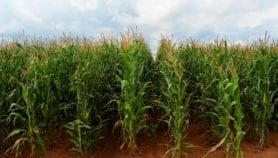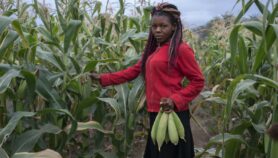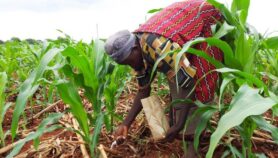By: Samuel Hinneh
Send to a friend
The details you provide on this page will not be used to send unsolicited email, and will not be sold to a 3rd party. See privacy policy.
[ACCRA] A new regional laboratory in Ghana is seeking to develop the vegetable industry through research, development and innovation to improve food and nutritional security in West Africa.
It will do this through increased use of indigenous vegetables. The laboratory will facilitate new approaches for engaging relevant stakeholders in the vegetable value chain for addressing the challenges of the industry.
The Vegetables Innovation Laboratory (VIL), which is located at the West Africa Centre for Crop Improvement (WACCI) based at the University of Ghana, will undertake research in genetic improvement; vegetable production, quality and processing and policy research. Its focus will also be on value chains, socio-economic research and knowledge management systems.
“Creating vegetable varieties and crop production practices that are resilient to climate change… and strains of pathogens and insects will be core concerns for the scientists working in the laboratory.”
Vivienne Anthony, Syngenta Foundation for Sustainable Agriculture
The VIL was launched last month (26 June) at the WACCI in Ghana.
The ten-year US$25 million project is funded by the Alliance for Agricultural R&D for Food Security represented by institutions such as the Syngenta Foundation for Sustainable Agriculture, the Crawford Fund and the Australian International Food Security Research Centre
According to the WACCI, food security initiatives in Sub-Saharan Africa have largely focused on producing more staple food crops, neglecting nutrient-rich vegetables. It adds that local production of vegetable has challenges such as lack of improved varieties, and competition from imported vegetables.
Eric Yirenkyi Danquah, director of WACCI, says the laboratory will develop framework for accelerating the development of the tomato and vegetable industry in Ghana and West African sub-region.
The laboratory is open to all social scientists, natural and physical scientists interested in taking tomato research to a higher level for innovation in the industry.
“A consortium which includes representatives from the Ghana’s Ministry of Finance, Ministry of Food and Agriculture, the University of Ghana, the national breeding programme at Crops Research Institute and the private sector has been formed,” says Danquah. "Through strategic partnerships and strong collaborations, proposals which facilitate cutting-edge research for the development of new tomatoes for the fresh markets and processing industry will be developed to boost the tomato industry.”
Danquah explains that the laboratory will provide farmers with technologies to increase yields.
"So creating vegetable varieties and crop production practices that are resilient to climate change… and strains of pathogens and insects will be core concerns for the scientists working in the laboratory,” she says.
Walter Alhassan, a former director-general, Ghana’s Council for Scientific and Industrial Research, praises the new laboratory, saying it will provide the needed database required for planning, diagnosing and addressing challenges in the vegetable sector
Currently, there is no institution in Ghana addressing challenges in the vegetable sector holistically and forging public-private partnerships for enhanced tomato production, Alhassan tells SciDev.Net.
This article has been produced by SciDev.Net's Sub-Saharan Africa desk.














